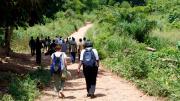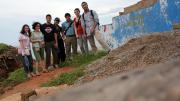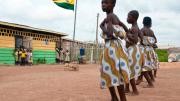A few weeks into summer, I read a satirical piece in Granta magazine’s issue 92, titled “How to Write about Africa.” The author, Binyavanga Wainaina, laid out a comprehensive list of what to portray and what not to portray. For instance, the cover of your book must have an AK-47, naked breasts, and/or a person in tribal garb. If you want an engaging story, you must include The Starving African, the pot-bellied children, the corrupt government bureaucrat, and the graphic descriptions of genital mutilation. You must immediately fall in love with the country. (It doesn’t matter which country; Africa, the continent, must be treated as one body.) It goes without saying that you must write as if, without Western intervention, Africa is doomed.
One week later I was sitting next to a Sony HVRZ1U camera, sweating profusely under that hot African sun, outside Desmercy School, a primary school outside Accra, Ghana. In front of the camera sat a pretty, wide-eyed girl with a small scar on her lip. She seemed unaffected by the sun. As my teammates adjusted her mike, she rolled her eyes, giggled when they place a large white shade in front of her face, and shifted on her chair as I explained that it’s just something they use to reflect light. Clementina Dankwa is 11 years old and wants to be a journalist, “so that I can broadcast what is going on in my country to my people.”
She is one of 120,000 African students in one of the 280 rural private schools being served by Opportunity International’s Banking on Education program.
This summer, I went to Ghana—the face of a new and happier Africa, the darling of development. This was not Conrad’s Congo, where the inhabitants were silent, nameless, and dehumanized, or Achebe’s Nigeria, on the cusp of change, grappling with identity in the throes of Christian expansion. This was Ghana, boasting a multitude of religions and satisfactory development, and now we were responsible for portraying a small part of it.
“We” were seven students from Harvard, Boston University, and the University of Texas at Austin, representing Students of the World, a nonprofit media-production organization that creates promotional media for other nonprofits around the world. We were covering the work of Opportunity International, a microfinance organization that operates in more than 20 countries. Opportunity International provides banking services, financial advice and training, and support to farmers, school proprietors, and small-business owners in Ghana. Our roles ranged from filmmakers to a journalist, a photographer, a producer, and a development coordinator.
Armed with cameras, notebooks, baby wipes, hand sanitizers, and our journalistic integrity, we interviewed clients under that hot African sun, bumping and grinding our way over hot, dusty roads in vans that seemed held together with glue, and surviving on sandwiches smeared with Nutella.
When work started, Wainaina’s stinging satire faded to the back of my mind. Speaking to more and more clients, filming farmers at work and visiting shops, schools, and restaurants, in the whole rush of shooting, we also started to absorb what characterized life in Ghana. Yes, we filmed the laughing children in school uniforms, the eager student raising his hand in class, the loan officers with beaming clients and cacao farmers standing among trees, their chests puffed out with pride, displaying what they had cultivated after years of hard work. What stood out more than the images were the individual stories, and through these was a potential solution to the long-standing problem of poverty.
We aren’t portraying Africa. We are portraying Mercy Senyegah, Clementina’s school proprietress, who left her village after being threatened by her husband’s creditors, only to start Desmercy School, which currently serves more than 200 pupils. We are portraying Ama Amponsah, a cacao farmer from Kumasi who singlehandedly lifted her family out of poverty and now owns two small houses she plans to give to her children.
It is easy to lump Africa into one country. In Ghana alone, there are 79 living languages, a diverse set of tribes, religions, and cultures and a peaceful, welcoming citizenry that give the country the distinction of being labeled the gateway to Africa, the first place Obama would visit on his first official tour of the continent.
Ghana faces the same problems of poverty as other African countries but it has stability and is developing fast. Opportunity International has more than 100,000 loan clients in Ghana alone. They are investing in education, farming, and increasing access to banking across Ghana. We met trust groups, made up mostly of women who met to discuss business practices and act as guarantors for each other’s loans. We observed their camaraderie, coupled with their interactions with loan officers, most of whom were friendly and informal, a cornerstone of Opportunity International’s successful lending.
We met people like Abena Sarpong, a stylish 25-year-old agro-finance loan officer, who was chosen by Opportunity International to attend business-management training in Kenya as part of the Emerging Leaders Program. This venture is supported by the Goldman Sachs Foundation’s 10,000 Women Initiative, which aims to aid 10,000 underserved women in the developing world. We joined her on her rounds to her clients’ farms and through them got to know the impeccably dressed woman who often served as our translator.
“[Abena] is not in a air-conditioned banking hall, no, she’s in a truck,” says Effie Cook, head of Opportunity’s human-resources department, “Most people want a career in banking, but to find someone who is doing what Abena is doing is really rare.”
Abena thinks giving financial advice to farmers is important: “Some people think farming is very difficult, very hectic, but it is something holding our country together…we should go back to our roots, our farms.”
Abena was posted to Opportunity International originally in accordance with Ghana’s national requirement that every college graduate spend at least a year doing public service in the public or private sector—a policy that seems to generate social consciousness. In conversations with young Ghanaians on the street and over meals, we found many of them were positive about their contributions to the economy. Of course, when the talk turned to politics, many were critical of the government, saying that the public-education system was a failure and they would go to private schools any day. This was a constant refrain among our interviewees at all the schools we visited.
Ghana pleasantly surprised us in its characteristically relaxed way. We did not fall in love with it immediately. Rather, the country grew on us as soon as we realized that it was pointless worrying about running late due to traffic because here, life and work go on at their own pace and on their own time. Ghana impresses in a subtle but effective way. So subtle that in postproduction and in the process of writing, I wondered how best to express Ghana’s impact on us.
Wainaina wrote his satire in a fit of frustration at one of Granta’s older “Africa” issues. To him it seemed that Africans were not part of the conversation: “we were ‘over there,’ where brave people in khaki could come and bear witness.” Perhaps as foreigners from elite universities in the United States, we were just those students hoping-to-save-the-world-one-summer-internship-at-a-time: we were the people in khaki. Perhaps.
Or maybe it was more about the people in the film. The conversation belonged to them. We sat and listened. Ghana’s future was in their hands—Abena’s and Clementina’s and Mercy’s. We would simply take their stories back with us.











